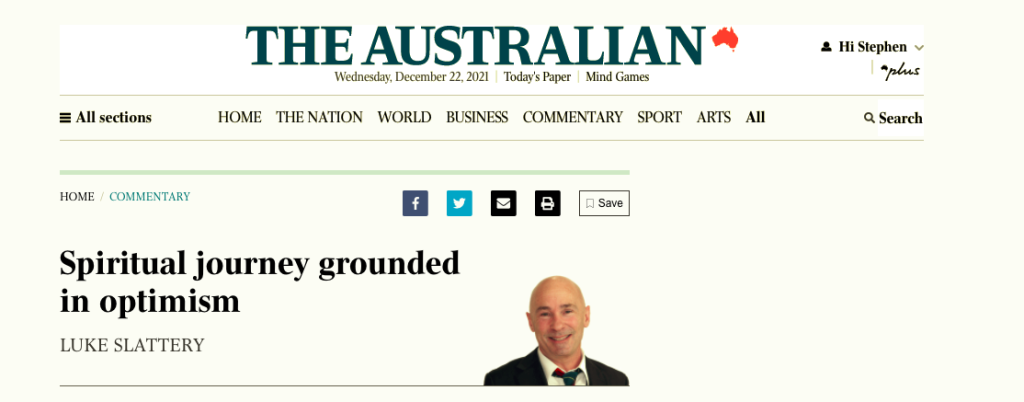December 23, 2021
Sorry Luke, most Christians DO believe in Christ’s miracles

So used are Christians to hearing that they have to know how their neighbours think or what the worldview of their friends is in order to engage them with the gospel, that it’s easy to forget how little non-Christians understand about what Christians believe.
Or how little they even bother trying.
It’s easy to forget that when it comes to apologetics and truly understanding the people you are dealing with, most of the traffic is going one way. Most non-Christians make seriously few attempts to understand their Christian neighbours, and don’t see the need to bother anyway.
And I’m not talking about what the average pagan punter in the street believes that we believe either. I’m talking about well-educated people. You know, people who write for newspapers and stuff.
People like the well-rounded, well educated Luke Slattery, long term columnist for The Australian newspaper.
Writing this week about the need in our culture for something with spiritual weight and substance, Slattery posits that although the Christian church is tanking in the West, the ideas behind the Christmas story are vital if we are to have a truly centred culture that has something worthwhile to believe in.
Slattery is no slouch. He has a background in philosophy and references Hume among others, while having a solid understanding of the Enlightenment. He sees the need for religion, specifically the Christian religion, and he’s liberal enough to know that the mish-mash of post-modern fog we’re descending into, coupled with the puritanical zeal of the new left and right ideologues, offers nothing tasty to our palates, or satisfying to our hearts. In short, he knows we have a meaning deficit.
But when I read pronouncements like this, in the context of his thoroughly modernist attempt to merely spiritualise the gospel story:
I wonder to what extent even the most committed Christians are really signed up to traditional religious narratives and imagery. I doubt many believe, for example, in Christ’s miracles.
Bleurgh!
I mean, seriously? It’s the most committed Christians who really do believe in Christ’s miracles. And what miracles are we talking about? The most committed Christians believe that Jesus rose from the dead – actually rose from the dead – which means that the other miracles, wine, walking on water, healings etc, are a piece of Christmas cake for Jesus.
The church in the West isn’t tanking because of people who DO believe in the miracles. It’s tanking because of those who claim to be Christians who don’t. The places that are now reduced to formalism, where the priests and powers that be are more concerned about whether we accept transgender clergy, but for whom the idea of a truly transcendent man is a bridge too far, they’re the places that are shutting up shop, and emptying the pews.
The problem is not too much belief in the church, turning people away, but rather too little (and perhaps too little practice attached to the belief we already have).
Of course, Slattery could have done some actual journalism as he pondered the question as to whether Christians do believe in Christ’s miracles.
I mean, he could have asked! He could have dispelled his doubts by doing some good old fashioned hack work and discovered that the bulk of committed Christians are firmly wedded to the truth of the Apostles’ Creed, lock stock and smokin’ barrel.
I know that’s it seemingly beyond an increasing number of journalists these days to test their pet-theories with actual evidence, but contrast it with his colleague at The Australian, Greg Sheridan, whose last two books on Christianity (albeit from the perspective of an interested believer), are full of journalistic inquiry. Not for Sheridan the lazy assumption. He committed himself to doing what the gospels themselves do – he asked the questions of the people involved.
Ironically Slattery’s desired spiritual framework is exactly what the West at this moment does not want, nor does it need. Slattery also accuses mainstream Christianity of having an optimism that the secular West does not have. Or, more to the point, he praises Christianity for having an optimism which the West does not have. But to believe Christianity to be optimistic is to miss the point. Here he is again:
An immense gulf separates this optimistic view of human nature from ours. We are, perhaps, far too aware of humankind’s secular fall – the Third Reich, the sins of colonialism – for this radiant species exceptionalism. But that’s no reason to turn away from, in a spirit of neglectful ignorance, the mystical tradition within Christianity.
Sorry Luke, we’re all too aware of that fall as well, but it’s not secular, it’s sacred. Those evils you name are yet another attempt by humans to over-reach and play god. The mystical tradition within Christianity has nothing to offer the meaty, visceral sins of humanity – only God incarnate does. We’re not optimists at all – specifically not optimists about human nature.
As the famed missionary/missiologist Lesslie Newbigin who when asked it he were an optimist or a pessimist ( and who understood the West better than Slattery because he got to observe it looking in at it, rather than looking out from it), replied:
I am neither an optimist nor a pessimist. Jesus Christ is risen from the dead!
Newbigin rightly saw what Slattery could not. Optimism and pessimism are thoroughly earth-bound processes, stubbornly rooted in the immanent frame that the West, like a drowning man holding a brick, is so desperately clinging to.
Slattery would be served well by having a chat with his fellow intellectual and philosophical traveller, the English writer and thinker, Douglas Murray. Murray observes that many of his formerly atheist, intellectual friends are turning to Christianity in these times of crisis and the absence of meaning in the West.
And what forms of Christianity are they turning to? Not the liberal, disembodied, mystical version founded by the likes of Schleiermacher et al, but the crunchy forms such as Orthodoxy in which Christ really did rise from the dead, and for whom the church is bigger than the world.
Slattery, for all my grumblings, is a good man and wants to pitch a better vision for humanity. But in his call for consumeristic Westerners to centre themselves on the mystical within the Christmas message he ends with this:
This is a challenge for all people who sense that they are on a spiritual, though not necessarily a religious, search. The challenge is to raise and enlarge the self, to move the mysteries at the periphery of daily existence to the core of consciousness.
Enlarge the self? Surely that’s the exact problem that the historical event of Christmas came to resolve. We are all for enlarging ourselves. Ever since our first parents reached out to be like God.
The vitality of the Christmas story is the God of the universe who, rather than enlarge himself (an impossible task) shrank himself to the perspective of a helpless baby who needed suckling, changed, dandled upon knees, and learn to talk, walk and read. If Slattery did some true investigative work he would discover that the way to truly find our lives is to lose our lives for the sake of the one who did indeed rise from the dead.
Written by
There is no guarantee that Jesus will return in our desired timeframe. Yet we have no reason to be anxious, because even if the timeframe is not guaranteed, the outcome is! We don’t have to waste energy being anxious; we can put it to better use.
Stephen McAlpine – futureproof
Stay in the know
Receive content updates, new blog articles and upcoming events all to your inbox.



